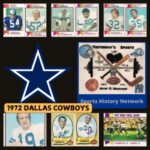Billy Martin was born in Berkeley, California, in 1928. His parents split up shortly after his birth, which had a profound emotional impact on Billy. As a child, he frequently got into fights and engaged in amateur boxing for a time before shifting his focus to baseball.
He wasn’t a natural, but through hard work and practice, he batted over .400 in his senior year of high school. After high school, he joined the Independent League, where he played for the Oakland Oaks. The team’s manager was Casey Stengel, who grew fond of Martin, and the two developed an almost father-son relationship.
In 1949, Stengel was hired to manage the New York Yankees. Martin joined the Yankees a year later. He played in only 34 games that season but proved to be a solid backup for Jerry Coleman at second base. The following season, he appeared in 51 games, backing up Bobby Brown at third base.
Starting For The Yankees
In 1952, he became the starting second baseman and batted .267 while providing excellent fielding. Here’s a great example of his fielding abilities: Jackie Robinson hit a high pop fly with the Yankees leading 4–2 in Game Seven of the World Series. A strong wind and a blinding sun caused first baseman Joe Collins to lose sight of the ball.
Martin sprinted from second base and caught it near home plate before it could hit the ground. This catch may have saved the win for the Yankees, considering it was the seventh inning, two outs, and the bases were loaded. Had the ball dropped, it’s possible three runners would have scored, giving the Dodgers a 5–4 lead. Instead, the Yankees won 4–2, taking the series four games to three.
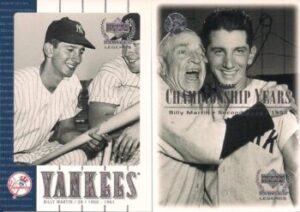
In 1953, Martin played second base again and started 149 games. Along with his impressive fielding, he belted 15 home runs, drove in 75 runs, and had a batting average of .257. In the World Series, Martin batted .500 with a record-tying 12 hits.
His exceptional performance helped the Yankees win their fifth consecutive World Series, and Martin received the Series MVP award.
Billy missed the entire 1954 season because of military service. It was the only year during his time with the Yankees that the team did not win the American League Pennant.
Martin’s military service lasted until 1955, but he played in the final twenty games of the regular season and the World Series. He batted .320 in the Series and drove in four runs, but the Yankees lost in seven games to the Dodgers.
In 1956, Martin played in 121 games and batted .264, but he continued to excel on the field and in the World Series, where he hit .296 with two home runs and three RBIs. The Yankees defeated the Dodgers four games to three. Additionally, 1956 was the only year Martin made the All-Star Team.
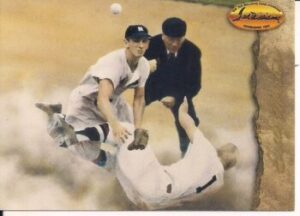
Traded to Kansas City Athletics
Martin played 43 games with the Yankees in 1957 before being traded to the Kansas City Athletics. The Yankees’ General Manager, George Weiss, never liked Martin. He didn’t appreciate Martin’s late-night carousing, his tendency to get into fights, and believed Martin wasn’t good for the Yankees’ image. Weiss was waiting for a solid reason to trade Martin, which came on May 16th.
Martin, some teammates, and their wives went to Copacabana that evening to celebrate Billy’s 29th birthday. That night, Sammy Davis Jr., the entertainer, was heckled by some drunken bowlers. The Yankees players told the bowlers to stop, but they continued their heckling and even used racial slurs. There are varying accounts of what happened next, but one of the bowlers ended up in the hospital with a fractured jaw and a broken nose.
Who threw the punch may never be known. Some say it was right fielder Hank Bauer, a former Marine, while others claim it was Joey Silvestri, who worked there as a bouncer. However, Weiss blamed Martin for the incident and traded him. Martin held Manager Casey Stengel responsible for the trade, damaging their once-close relationship.
Martin concluded the 1957 season with the Athletics and spent four additional seasons with the Tigers, Indians, Reds, and Twins, but he was never the same player after leaving the Yankees. In 1960, Martin had a confrontation with Chicago Cubs pitcher Jim Brewer while playing for the Reds. Brewer sustained a broken eye socket, and the Cubs subsequently sued Martin.
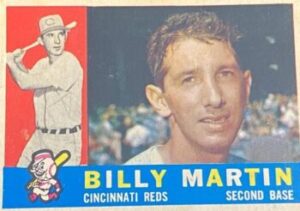
Billy's Coaching Career
In 1965, the Twins hired Martin as a third base coach. One year later, Martin fought with the Twins’ traveling secretary. Despite the fight, the Twins kept Martin and hired him as their Manager in 1969 after the Twins finished the 1968 season with a 79–83 record. Martin proved his worth as a Manager. The Twins finished the 1969 season with a 97–65 record, but lost to the powerful Baltimore Orioles in the American League Championship Series.
But Billy ‘The Kid’ couldn’t stay out of trouble. At one point during the season, former Vice President Hubert Humphrey visited the Twins’ clubhouse and was ejected by Martin. The incident embarrassed team officials, who apologized to Humphrey. Martin also got into an altercation with Twins pitcher Dave Boswell outside a bar. The Twins’ front office determined that Martin wasn’t worth all the trouble he was causing and fired him after the playoffs.
In 1971, Martin was hired by the Detroit Tigers. After winning the World Series in 1968, the Tigers ended the 1970 season with a disappointing 79–83 record. Under Martin, the team compiled a 91–71 record in 1971 and finished first in their division in 1972 before losing to the Oakland A’s in the playoffs.
1973 was not as successful for the Tigers. Martin’s drinking spiraled out of control, and he feuded with several of his players throughout the season, particularly All-Star leftfielder Will Horton. He also openly criticized the Tigers’ front office. On August 30, the Tigers faced the Cleveland Indians. On the mound for Cleveland was Gaylord Perry, known for throwing spitballs. Martin complained to the umpires that Perry was ‘loading up the ball’, but the umpires ignored his complaints.
Martin instructed his pitchers to do the same and admitted it to the media after the game. This led to Martin being suspended by American League President Joe Cronin. The Tigers’ record at this point was 71–63, trailing the first-place Orioles by 7 1/2 games. The front office had seen enough of Martin’s antics and fired him before the suspension ended.
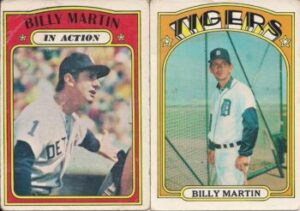
Moving To Texas - Different This Time?
The Texas Rangers hired him with 23 games left in the 1973 season. The Rangers ended that season with a 57–105 record, the worst in the league. Despite the trouble Martin often found himself in, no one could deny he knew how to win. He quickly turned the Rangers into contenders, finishing the 1974 season with 84 wins and 76 losses, just five games behind the first-place Oakland A’s in their division. Martin came in second place for the Manager of the Year Award.
But things were different in 1975. Once again, Billy drank too much, had conflicts with certain players, and openly criticized front office personnel. Things reached a peak on July 20. With the team struggling in fourth place and 15 games behind the first-place Oakland A’s, the Rangers were at home, playing a doubleheader against the Red Sox. During the seventh-inning stretch, Martin told the public address announcer to play ‘Thank God I’m a Country Boy’ instead of the traditional ‘Take Me Out to the Ball Game’.
Owner Brad Corbett was furious that Martin took it upon himself to decide what song should be played. The Rangers split the doubleheader, leaving them with a dismal 44–51 record, and Billy was fired the next day.
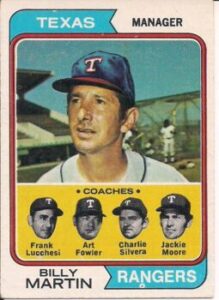
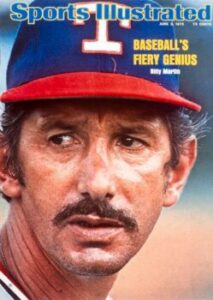
Back to the Yankees
By this time, it was clear that anyone looking to hire Martin understood it would be a short-term arrangement, a quick fix. However, one owner was searching for exactly that. George Steinbrenner purchased the Yankees in 1973, and in his first year of ownership, the team finished with an 80–82 record. In 1974, they ended two games behind the first-place Orioles with an 89–73 record.
With 56 games remaining in the 1975 season, the Yankees were in third place, ten games behind the first-place Red Sox, with a 53–51 record. Steinbrenner wasn’t interested in second or third-place finishes and fired Manager Bill Virdon. He then hired Billy Martin as the new Manager. The Yankees won 30 of the next 56 games and ended in third place, twelve games behind the Red Sox. But Billy’s hiring wasn’t focused on this season; it was about 1976.
The Yankees concluded the 1976 season with a 97–62 record and faced the Kansas City Royals in the ALCS. They won the hard-fought series 3 games to 2, capturing their first pennant since 1964. Although the Yankees were no match for the powerhouse Cincinnati Reds, who swept them in the World Series, it was only a matter of time before they would be crowned World Series Champions.
The Yankees signed free agent Reggie Jackson during the off-season, but Martin was not thrilled with the decision. Martin felt that Reggie might be a prima donna who wouldn’t take orders, which was ironic given that many owners didn’t want to hire Martin for those same reasons.
Additionally, some wondered if there were still bad feelings between Martin and Jackson dating back to the 1969 season. Jackson had accused Martin, who was managing the Twins at that time, of ordering his pitchers to throw at him. In any case, the two would need to learn to coexist.
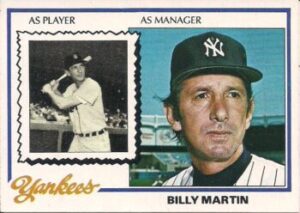
Billy Martin & Reggie Jackson
In a game at Fenway Park on June 18, Martin and Jackson got into a heated shouting match in the dugout after Martin pulled Jackson from the game for not hustling. The Red Sox swept the three-game series, and after losing the next two games to the Tigers, the Yankees found themselves 4 1/2 games out of first place with a mediocre 36–31 record. This was not what Steinbrenner had envisioned when he hired Martin.
But the Yankees went 64-31 for the rest of the season, finishing with 100 wins and 62 losses. They defeated the Royals again in the ALCS and the Dodgers four games to two in the World Series. Reggie Jackson hit three home runs in game six of that series, and suddenly, he and Martin were posing for pictures together. Winning cures all!
But losing has the opposite effect, and the defending champions were experiencing a lot of losses in 1978. By July 17th, the Yankees’ record stood at 47–42, fourteen games behind the first-place Red Sox. The Yankees were facing the Royals that day, and with Jackson at the plate, Martin signaled for a bunt. After Jackson fouled off the first pitch, Martin instructed him to swing away.
However, Jackson attempted to bunt anyway and popped out. Martin was furious and wanted Jackson suspended for the rest of the season. After discussions with Steinbrenner, it was decided that Jackson would receive a 5-game suspension.
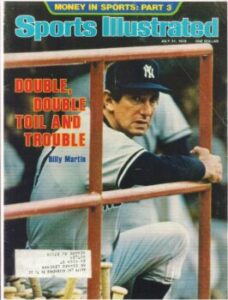
The Yankees were swept in the three-game series against the Royals and had now lost nine of their last eleven games. However, they then won five in a row without Jackson. When Jackson returned, neither Martin nor the media forgot about the incident.
At this point, Martin made his infamous comment to reporters when asked about his relationship with Jackson and Steinbrenner. Martin was quoted as saying, “one’s a liar and the other’s convicted.” Knowing he was about to be fired, Martin resigned. The majority of Yankees fans supported Billy.
Bob Lemon, who the White Sox had just fired, was hired as the new manager. Under Lemon, the Yankees made a historic comeback to claim first place and went on to win the World Series. During the off-season, Martin got into another altercation with a reporter.
The Yankees started slowly in 1979. By mid-June, they were in fourth place with a 34–31 record. Steinbrenner dismissed Bob Lemon, who had led the team to their second World Series Championship in a row just eight months earlier. Billy Martin was rehired as the Yankees’ skipper, and the team showed some improvement. By August 1, their record stood at 58–48, but the next day, Yankee Captain Thurman Munson was tragically killed in a plane crash. The Yankees ended the season in fourth place with an 89–71 record.
Martin’s pattern of drinking and fighting continued to plague him. During the off-season, he knocked out a marshmallow salesman, and Steinbrenner fired him once more.
Oakland Athletics - "Billy Ball"
It seemed like the end of the road for Martin until Oakland A’s owner Charley Finley hired him. Billy had his work cut out for him with a team that had finished the 1979 season with a record of 54–108. However, if there was one thing Martin excelled at, it was turning losing teams into winning teams, even if it was just a short-term fix. The A’s finished the 1980 season with an 83–79 record, twenty-nine wins more than the previous season, and Martin won the Manager of the Year Award.
Finley sold the team before the 1981 season, and the new owners gave Martin complete control over the team. By early May, the A’s were 20–3. Martin had the A’s playing an aggressive, intimidating style of baseball in which they weren’t afraid to take chances. A sports writer called it “Billyball,” and the name stuck. After the fast start, the team cooled off considerably, losing ten of eleven games at one point. However, after 60 games, the A’s still had the best record (37–23) in the American League.
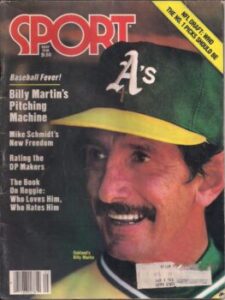
On June 12, the players went on strike for nearly two months. The A’s resumed play on August 10 and finished the season with a 64–45 record, the best in the American League. They swept the Royals in their first playoff series but were than swept themselves by the Yankees.
The A’s and their fans had high expectations for the 1982 season, but nothing went as planned, resulting in a dismal 68–94 record. Some blamed Martin for overusing his young pitching staff in 1981. Although the A’s ownership did not hold Martin responsible for the team’s poor performance, they expressed concerns about his off-the-field behavior.
Martin, still a heavy drinker, was on his third marriage and was openly having an affair with another woman during the season. As if this wasn’t bad enough, Martin wrecked his office in a fit of rage when team officials denied his request for a loan. That was the last straw, and Martin was fired for the sixth time in his managerial career. His tenure with the A’s was the only time in his managerial career that he lasted three full seasons before being let go.
A Yankee's Last Hurrah!
The 1982 Yankees wrapped up the season with a 79–83 record, their worst since 1967. Steinbrenner hired and fired three managers throughout the season. In January 1983, he hired Martin for the third time. Despite the ongoing drinking, fighting, and infidelity, Martin guided the team to a 91–71 record. However, that record was only enough for second place, which wasn’t satisfactory for George, who dismissed Martin again and offered him a job as a scout.
Yogi Berra managed the Yankees in 1984, leading the team to an 87–75 record. After the Yankees started the 1985 season with six wins and ten losses, Berra was fired, and Martin was rehired. The team played well until they experienced an eight-game losing streak from September 13th to the 20th. On the evening of September 22, after a victory against the Orioles, Martin was in a hotel bar and got into a fight with one of his pitchers, Ed Whitson.
Whitson emerged victorious, and Martin left the bar with a broken arm. With only twelve games remaining in the season, Steinbrenner refrained from firing him. The Yankees posted a 91–54 record under Martin but finished two games behind the first-place Toronto Blue Jays.
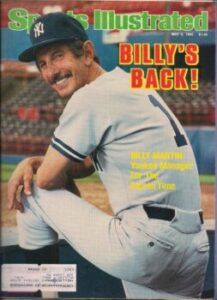
Martin was fired on October 27th but retained as a scout. Steinbrenner even increased his salary to ensure he wouldn’t take any offers from other teams. Despite all the baggage Billy carried, other owners were still eager to hire him because they knew he could help them win.
Despite all the problems Martin caused for himself and Steinbrenner, George genuinely liked Billy and hired him as an advisor for the 1986 season. Martin also did some broadcasting for Yankees games with his former teammate Phil Rizzuto. On August 10th, the Yankees retired his number 1 and presented him with a plaque in Monument Park.
After the Yankees finished five and a half games out of first place in 1986 and nine games out in 1987, Steinbrenner rehired Martin as Manager for the 1988 season. It didn’t take long for Martin to get into trouble again.
It was more of the same: drinking, fighting, marital issues, and disrespecting umpires. Martin was suspended for three games after throwing dirt on an umpire, and while this was not the first time, it would be the last. Martin was fired again, leaving the Yankees with a solid 40–28 record. Steinbrenner kept him on as an adviser.
On Christmas Day in 1989, Martin and a friend went out drinking. While driving back to Martin’s home in Upstate New York, they slid on black ice and crashed into a ditch. Martin was pronounced dead at the hospital. He was 61 years old.
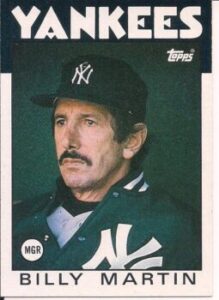
Hall of Fame Worthy?
Some believe Martin should be inducted into the Baseball Hall of Fame. Although he may never have managed a team long enough to deserve that honor, he does have some impressive credentials.
1 — He took over a struggling Twins team and, within a single season, led them to the ALCS.
2 — He took over a losing Tigers team and, in just two seasons, had them playing in the ALCS.
3 — He took over a losing Texas Rangers team (formerly the Washington Senators), and within a year, they achieved a winning record. This was only the second time in the team’s 14-year history that they had a winning record.
4 — He took over a Yankees team that was average at best, and within a year, they won their first pennant in twelve years. The following year, the Yankees secured their first World Series title in fifteen years.
5 — He took over an Oakland A’s team with the second-worst record in the league, and within two years, they were playing in the ALCS.
6 — In 1983, he once again took over a struggling Yankees team and turned them around. He did it again in 1985.
7 — He won the Manager of the Year award in 1976 and again in 1981.
8 — He led the Yankees to two American League pennants and one World Series trophy.
9 — He had a career winning percentage of .553.
10 — He was the first manager to guide four different teams to the postseason.
Say what you will about his reckless behavior and lifestyle, but Billy ‘The Kid’ was one heck of a manager.
Please Consider Sharing If You Like This Article
Mark Morthier is the host of Yesterday’s Sports, a podcast dedicated to reliving memorable sports moments from his childhood days and beyond. He grew up in New Jersey just across from New York City, so many of his episodes revolve around the great sport’s teams of the 70s for the New York area.
He is also an author of No Nonsense, Old School Weight Training (Second Edition): A Guide for People with Limited Time and Running Wild: (Growing Up in the 1970s)

Check out Mark's Books Below
Please Note – As an Amazon Associate I earn from qualifying purchases
Resources
More From Yesterday's Sports
1972 Dallas Cowboys: From Duane Thomas Drama to Staubach’s Stunning Comeback
After posting an impressive 69–24–2 record over the last six...
Read More1990 NFC Championship Game (Giants vs. 49ers) – The Game That Ended A Dynasty
From 1969 to 2006, I was a big fan of...
Read MoreBilly “The Kid” Martin : Hall of Fame Worthy or No?
Billy Martin was born in Berkeley, California, in 1928. His...
Read More1970 New York Yankees: New Hope?
Every dedicated baseball fan knows that the New York Yankees...
Read More


